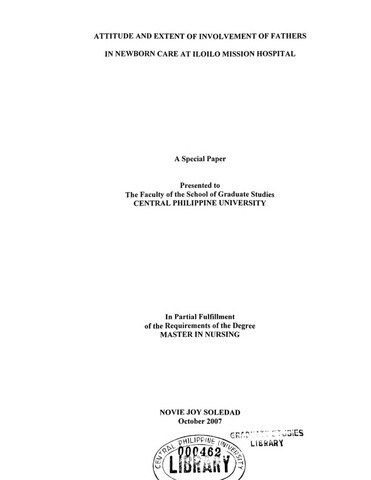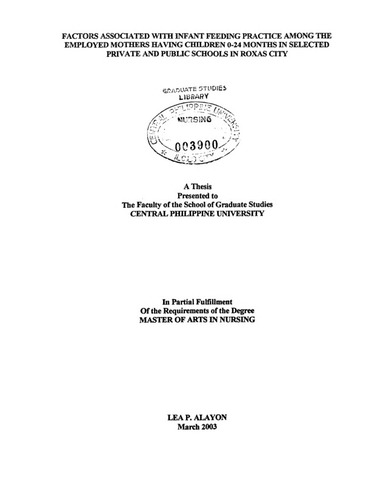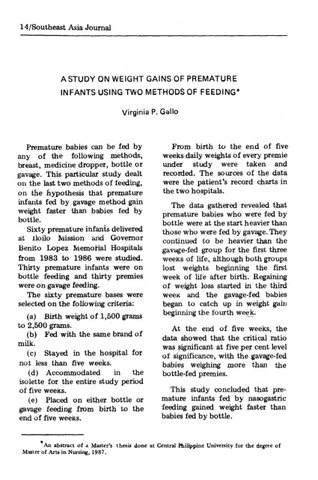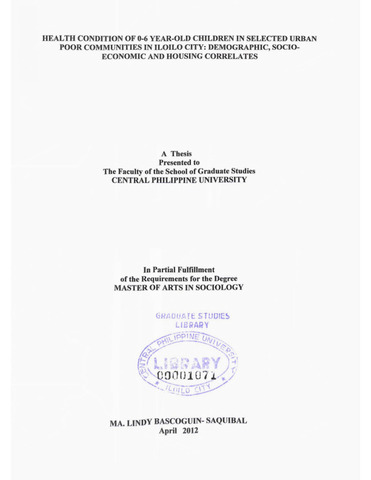| dc.description.abstract | This study aimed to determine respondents’ attitude towards newborn care and their involvement in newborn care activities. Specifically, the objectives of the study sought to determine the characteristics of respondents in terms of age, occupation, monthly income, and number of children; the attitude towards newborn care; the extent of involvement in care of the newborn in the hospital in terms of putting to sleep, changing of diapers, feeding and burping, bathing and cord care. Further, this study aimed to determine the relationship between the characteristics of the fathers, such as, age, employment status, monthly income, and number of children, and their attitude towards newborn care in the hospital, the relationship between characteristics of the father in terms of age, employment status, monthly income, number of children and extent of involvement in newborn care activities and the relationship between father’s attitude towards newborn care and their extent of involvement.
This is a descriptive-relational type of study that used the one-shot survey design. The target population consisted of fathers of roomed-in babies in Iloilo Mission Hospital from November 2006 to January 2007. The total number of respondents was seventy. A self-administered questionnaire was used to collect the data needed for the study.
Major Findings of the Study
Most of the fathers in this study were 30 years old and below and are employed, with a family income ranging from P5,000 and below to P5,001-P10,000. The mean income was P6,413.09. Most of them were fathers for the first time.
Majority of the respondents have favorable attitude towards newborn care. They scored 11-15 points out of a 15-item statement about newborn care. The most common newborn care activities that fathers are involved in are putting the baby to sleep, changing diapers, feeding, burping the baby, and bathing. Fathers whose babies stayed in the hospital for 2-4 days (Group A) had moderate participation in newborn care activities while fathers whose baby stayed in the hospital for 5-7 days (Group B) have high participation in newborn care activities.
Some fathers were afraid to handle the newborn baby and do not know how to do newborn care or still learning how to do it. Those fathers who had favorable attitude wanted to bond with their newborn babies and wanted to learn how to take care of their newborn. Those who had unfavorable attitude are afraid to handle the newborn and that the baby is so “fragile”.
Age, employment status, monthly income, and occupation did not influence father’s attitude in newborn care and involvement in newborn care activities. Irrespective of age, employment status, monthly income, and occupation, attitude towards newborn care was favorable and there is high participation in newborn care activities.
Father’s attitude was not related to his extent of involvement in newborn care activities. Fathers with favorable attitude had high participation in newborn care activities.
Conclusion
The results indicate that father’s age, employment status, monthly income and number of children were not related with attitude towards newborn care. Regardless of whether the respondent is young, employed or unemployed; how much they earn, and their number of children, most of the father’s attitude towards newborn care is favorable.
Father’s attitude towards newborn care is not related with his involvement in newborn care activities. The fathers who had favorable attitude towards newborn care have high participation in newborn care activities. The reasons why some fathers had low participation in newborn care was mainly because they considered newborn babies very “delicate” and “fragile”, and that they do not know how to handle the newborn and are still learning newborn care activities.
Father’s age, employment status, monthly income, and number of children were not related with his involvement in newborn care activities. Regardless of whether the respondent is young, employed or unemployed; how much they earn, and their number of children, most of the father’s had high participation in newborn care activities.
This study is related on the Social Cognitive Theory by Albert Bandura, that human behavior is defined as a triadic, dynamic, and reciprocal interaction of personal factors, behavior, and the environment and an individual’s behavior is uniquely determined by each of these three factors. Father’s characteristics would influence his attitude towards newborn care. The younger the father, his attitude towards newborn care is expected to be favorable because first time fathers are “excited” though apprehensive compared with fathers having two or more children. Fathers who are unemployed may likely have a favorable attitude towards newborn care because they tend to spend more time to take care of their children. Father’s monthly income may affect his extent of involvement in newborn care because if the father is earning less, his involvement may be high because of the fact that he cannot afford to hire somebody to take care of his baby.
Recommendations
To further improve father’s attitude and involvement in newborn care, it is recommended that:
1. Since the findings of this study revealed that father’s have positive attitude towards newborn care,
expectant mothers should continue to motivate their husbands to be actively involved in the care of their expected baby by imparting what they have learned during mother’s class.
2. Seminars / lectures on how to do newborn care, emphasizing its positive effect on parent-infant bonding / relationship be conducted by health care professionals like doctors, nurses and midwives to husbands and wives during pre-natal checkup. Husbands should be encouraged to attend at least one pre-natal session of their wives. The knowledge that they will gain during the lecture will, in one way or the other, change their attitude towards newborn care.
3. The NGO at Barangay Level and Barangay Health Workers should initiate in teaching fathers how to care for the newborn.
4. Hospital, maternity, and lying-in clinics should plan programs and activities that would involve fathers in the care of the newborn baby, most especially first time fathers.
5. Men should understand that they have a vital role in newborn care activities. Modifying terms and concepts being used, educational programs and advertisements through the mass media can affect gender sensitivity.
6. Legislators should look into the provision of longer Paternity Leave with pay in institutions for all married male employees (casual or regular) to encourage more involvement / participation in newborn care activities.
7. To sustain / continue the development of health care programs that would motivate fathers to increase extent of involvement in newborn care. Mother’s classes should not focus only on lectures, but should also include actual demonstration on how to care for the newborn like bathing, and changing diapers. Fathers, especially the new ones, should perform a return demonstration on these procedures.
8. For pediatricians and health care institutions to strictly implement Rooming-In Policy (RA 7600) to empower father’s role to be actively involved in newborn care activities and further improve attitude and involvement of fathers.
9. Media like TV/radio commercials related to care of infants should also consider men / fathers as models or product endorsers.
10. Programs / projects to encourage men to pay more attention or to get more involved in newborn care and its potential beneficial impacts on marriage and on men’s emotional development.
11. Further research study on newborn care activities by fathers. | en_US |





